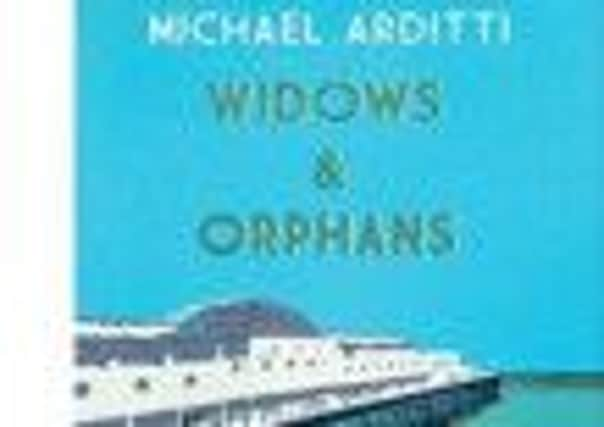Book review: Widows and Orphans by Michael Arditti


Only the title of Michael Arditti’s hugely enjoyable new novel is odd. Widows and orphans are scarce on the ground, but there are numerous divorced characters and numerous sons, daughters and step-children. It’s a family novel but also a comic condition of England one, a decidedly depressed condition it should be said, though the novel itself is anything but depressing. Indeed it’s remarkable in being for the most part kindly. This is rather rare in fiction today, therefore all the more welcome. Arditti evidently likes most of his characters, especially those who are struggling against adversity.
The setting is Francombe, once a prosperous seaside resort and fishing-port on the south coast of England, now in sharp decline, with the high street shops closed and most of the hotels turned into hostels. The hero, Duncan Neville, is the fourth-generation proprietor and editor of the local newspaper, the Mercury. He is an honourable man who strives to keep up standards, but is fighting a losing battle on two fronts, for his campaign to prevent the town’s pier being transformed into a sort of erotic Disneyland is as doomed to failure as the Mercury itself. The once flourishing paper is now run by a skeleton staff. Most of the imposing Mercury House is just a reminder of past glories, and Duncan himself lives there, since his divorce in a flat where his father used to bed secretaries.
Advertisement
Hide AdHe has family problems too. His mother, Adele, a beautifully-drawn comic-pathetic character, swithers between denial of the Mercury’s plight and criticism of Duncan for not being the man his father was. She still lives in some style, cared for by gay factotum Chris. Duncan is still on good terms with his ex-wife Linda, now married to the brother of the developer, but relations with his 13-year-old son Jamie are difficult. Duncan is well-meaning, but one can see why Jamie finds him embarrassing. He resents attention which he feels is nagging, and, dazzled by his 16-year-old step-brother Craig, regards his father as a sad loser who drives a 20-year old Volvo he calls Rosinante. It is not clear – and shouldn’t be clear – whether Duncan sees himself as a latter-day Don Quixote, or whether, despite the name he has given his car, he is only unconsciously quixotic. The relationship of Duncan and Jamie is so tenderly and acutely drawn that one finds oneself hoping that things will come right in the end. Jamie may be truculent and rude but the loving gentleness with which he treats his severely disabled four year-old half-sister, Rose, gives reason for such hope.
Things look up in Duncan’s personal life when he meets and falls for Rose’s therapist, Ellen, a damaged survivor of a disastrous marriage and an upbringing by a ghastly “New Age” mother. Ellen, however, has her problems. Her daughter Sue has fallen for Craig and engages in activities unsuitable for her age, while her son Neil dislikes and resents Duncan, and, to complicate matters, is regarded as “pond-life” by Jamie. A dramatic twist in the plot brings matters to a head, and leads to a satisfying denouement.
Arditti skilfully marries social and personal themes. The picture of the decaying town is broadly satirical, yet there is nothing satirical in his treatment of personal relations; his characters are seen in the round, and presented with understanding and sympathy. Duncan especially is a triumph, clumsy and often tactless, but an honourable man who acts in accordance with the dictates of his conscience.
One of the many pleasures of this novel is the range and depth of the author’s sympathies. On the one hand there is the wretched condition of England as exemplified by Francombe’s decline, and the seedy vulgarity of the development proposed to revive it; on the other the decency and courage of so many characters, minor as well as major ones. Moreover, Arditti has a fine eye for the significant detail, and the novel is beautifully constructed.
There is nothing showy or experimental about it, so it probably won’t win any prizes. Nevertheless, as a picture of life as it is often painfully and yet rewardingly lived, it’s a better novel than most that do win prizes. It is funny and moving and deeply engaging.
FOLLOW US
SCOTSMAN TABLET AND MOBILE APPS